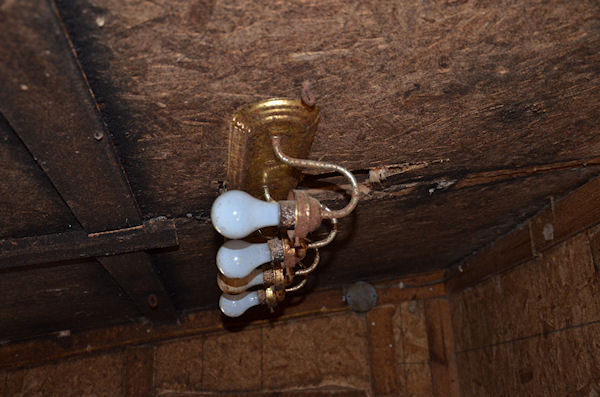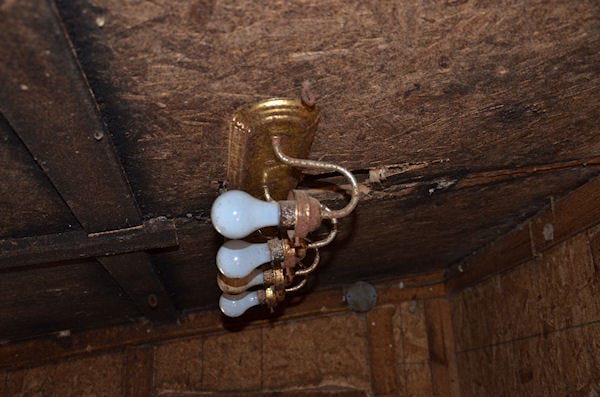
The barn lights – not heat lamps – burned for nearly two months straight this winter in the lambing barn. We installed new cameras, and while they provide night vision, the image is much sharper if there is more light. So I always left these lights on. I finally shut them off after the last ewe lambed and we took down the cameras and tucked them away for next year.
Related: 7 Tips To Prevent Farm Barn And Building Fires

At one time a bathroom light fixture seemed like a good fit for the barn – notice it is corroding. A mouse nest was found inside the electrical box feeding this outlet.
Four days later I was feeding in the barn when I heard a noise, looked up at the top of the entrance door, and saw flames shooting between to wires – one metal-encased wire and another wire. I instinctively hit the light switch and it stopped. Almost without thinking I flipped it on again to make sure I saw what I thought I saw. Poof! Flames shot out again and smoke tailed off after I shut off the switch. This time I also threw the breakers, and soon even threw the main breaker in the main panel for service coming into the farmstead.
Only the grace of God is behind that barn still standing. As the old country Western song about "Poncho and Lefty," two Mexican characters form the old West days, says, "The Federales say they could have had him any day…" The barn could have gone up in flames any night, any time. The genetics I've bred for would have been lost, along with the barns. Since our barns are close together, we likely would have lost them all.
I've written insurance stories about knowing what coverage you have in case certain things happen. This isn't about insurance. As one commercial for a competing company to some of the big giants says, "In a moment like this, you don't care if you can save 15% on car insurance in 15 minutes." The moment is when you've just had a wreck, and you are picking up pieces of your car off the road.
In a situation like this I really didn't care about the insurance – I had coverage and I'm sure financially I would have recovered more or less. But thinking about the loss of animals you care for and the whole thing of a fire, it makes you feel violated in some way.
This was a wake-up call, and when God slams you hard, you better respond. The bad wiring has been replaced. It should be safe to operate the barn again.
Like many people I floated along, getting by, thinking nothing would ever happen to me. It didn't. But it should have. Therein lies the life lesson.
Sometimes God has to beat you over the head with a two-by-four to get your attention. Once he gets it, don't make him have to use a second two-by-four. Take the hint the first time. The second shot might be a knock-out punch.
Take a good look at your wiring and outlets when you walk into an older barn next time. Are you safe? Don't be like me – I about had Mayhem, the funny guy from the All-State commercials – land in my farmstead in terms of burnt buildings and lost animals. Take the hint and do something about it before disaster strikes.
About the Author(s)
You May Also Like




